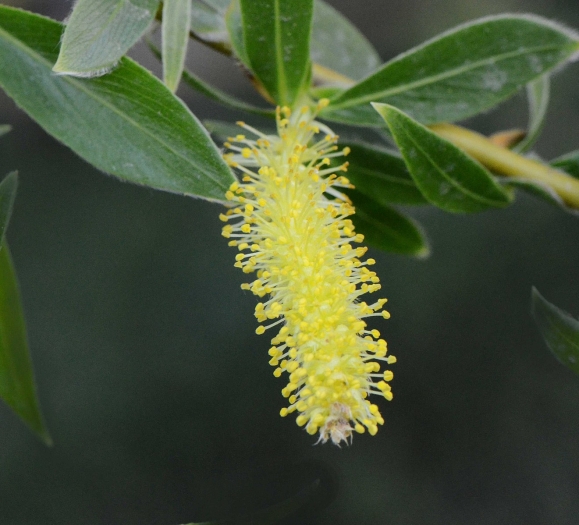Coral Bark Willow
(Salix vitellina)
Coral Bark Willow (Salix vitellina)
/
/

Pancrat
CC BY-SA 3.0
Image By:
Pancrat
Recorded By:
Copyright:
CC BY-SA 3.0
Copyright Notice:
Photo by: Pancrat | License Type: CC BY-SA 3.0 | License URL: https://creativecommons.org/licenses/by/2.0 | Uploader: Pancrat | Publisher: Wikimedia Commons |

















Estimated Native Range
Summary
Salix vitellina, commonly known as Coral Bark Willow, is a deciduous tree native to riparian zones, lakeshores, and wetlands across Europe. It typically grows to a height of 15-80 feet (5-24 meters) and a width of 10-50 feet (3-15.2 meters). The tree is notable for its striking yellow to orange-red young stems, which provide winter interest in the landscape. The leaves are lanceolate and bright green, turning yellow in the fall. Catkins appear in early spring before the leaves, adding to the tree’s ornamental value.
Coral Bark Willow is valued for its fast growth and ability to stabilize soil in wet areas, making it useful for erosion control. It thrives in moist to wet soils and can tolerate periodic flooding, which makes it suitable for planting along waterways and in rain gardens. This willow prefers full sun to part shade and requires soils with medium drainage. It is often used in naturalistic plantings and as a focal point in winter gardens due to its colorful bark. Gardeners should be aware that willows can have aggressive root systems that may interfere with underground utilities or structures. Regular pruning can manage size and encourage the growth of colorful young stems.CC BY-SA 4.0
Coral Bark Willow is valued for its fast growth and ability to stabilize soil in wet areas, making it useful for erosion control. It thrives in moist to wet soils and can tolerate periodic flooding, which makes it suitable for planting along waterways and in rain gardens. This willow prefers full sun to part shade and requires soils with medium drainage. It is often used in naturalistic plantings and as a focal point in winter gardens due to its colorful bark. Gardeners should be aware that willows can have aggressive root systems that may interfere with underground utilities or structures. Regular pruning can manage size and encourage the growth of colorful young stems.CC BY-SA 4.0
Plant Description
- Plant Type: Tree
- Height: 15-80 feet
- Width: 10-50 feet
- Growth Rate: Rapid
- Flower Color: N/A
- Flowering Season: Spring
- Leaf Retention: Deciduous
Growth Requirements
- Sun: Full Sun, Part Shade
- Water: Medium, High
- Drainage: Medium, Fast
Common Uses
Bee Garden, Bird Garden, Butterfly Garden, Deer Resistant, Erosion Control, Hummingbird Garden, Salt Tolerant, Water Garden
Natural Habitat
Native to riparian zones, lakeshores, and wetlands across Europe
Other Names
Common Names: Scarlet Willow , Golden Willow , Dotterweide , Gulpil
Scientific Names: Salix alba subsp. vitellina , Salix alba f. vitellina , Salix vitellina , Salix fragilis f. vitellina , Salix ×rubens f. sanguinea , Salix alba var. chermesina , Salix ×chrysostela , Nectolis vitellina , Salix ×fragilis f. sanguinea , Salix alba f. chermesina
GBIF Accepted Name: Salix alba subsp. vitellina (L.) Schübl. & G.Martens